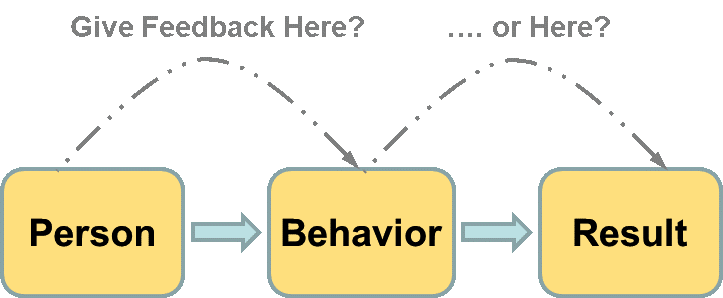 If you’ve been a manager for very long, you’ve undoubtedly been told to “focus on the behavior, not the person” when giving feedback. I’ve heard it throughout my career, but like so many clichés, it is a bit oversimplified. Actually, it really doesn’t make sense. Isn’t a person’s behavior part of their being a person? At best, this advice is confusing. Worse, it prevents managers, parents, and others in positions of influence from giving any feedback at all for fear of giving feedback incorrectly.
If you’ve been a manager for very long, you’ve undoubtedly been told to “focus on the behavior, not the person” when giving feedback. I’ve heard it throughout my career, but like so many clichés, it is a bit oversimplified. Actually, it really doesn’t make sense. Isn’t a person’s behavior part of their being a person? At best, this advice is confusing. Worse, it prevents managers, parents, and others in positions of influence from giving any feedback at all for fear of giving feedback incorrectly.
In defense of “focus on the behavior”, it is intended to guide managers away from assigning labels to people. Labels like he is “arrogant” and “lazy” or she is “negative” and “self-centered” are too broad and unfairly classify people. Even more troubling with labels is they imply a fixed mindset. In other words, they imply that people are stuck with a given trait forever and can’t change. For example, if you tell someone they are careless or aren’t a team player, even when you are thinking about a specific situation, you are implying that they are always that way.
As most know, people can change. So instead of labeling someone, more experienced feedback providers talk about specific traits and behaviors that can be changed or developed. Yet, this explanation still doesn’t validate the “focus on the behavior” approach. Telling managers and parents to focus on someone’s behavior only scratches the surface of behavioral change. Behaviors are the result of people’s thinking and their circumstances. Behaviors are the result of intent, beliefs, fears, and desires. If you focus on behaviors to the exclusion of people’s thinking and circumstances, you totally miss the drivers behind people’s behavior. You are discussing symptoms rather than root causes. Merely talking to people about their behaviors is like talking to a doctor who can’t ask any questions about the pain in your stomach. Rather than ask questions and truly understand what is causing the pain, all the doctor can do is talk about how to handle the pain.
Focusing on a person’s behavior is a good start, but not sufficient. Maybe a better cliché than “focus on the behavior” would be “start with the behavior, but focus on the thinking and circumstances that precede it.” This would guide coaches, leaders, friends, and parents to have more authentic and meaningful dialogs. This would move people away from labels and toward the specific thought that created the observed behavior.
How do you “start with the behavior, but focus on the thinking and circumstances that precede it” when giving feedback? When you help your friend, colleague, or child, on what do you give attention? Here are four elements to consider:
- Behaviors – Observe. State the observed behavior without judgement. Stick to the facts. Describe the impact on them and others. Withhold opinion, especially any criticism, until people have a chance to provide their perspective.
- Cognition – Explore their thinking that preceded their behavior. Discuss any relevant goals, priorities, strategies, or plans that instigated their behavior. Talk about how they made their decision or arrived at their conclusion.
- Automatic thinking – To the extent you are trusted and can be authentic, discuss the fundamental beliefs, values, desires, or fears that created their thinking. Ask what their instinct told them to say or do and why.
- Circumstances – Discuss any circumstances in their environment that may have contributed to their thinking and behavior. People rarely succeed or fail solely on their own. We are a byproduct of the environment in which we work and live.
Article by Mike Hawkins, award-winning author of Activating Your Ambition: A Guide to Coaching the Best Out of Yourself and Others (www.ActivatingYourAmbition.com), author of the SCOPE of Leadership six-book series on coaching leaders to lead as coaches (www.ScopeOfLeadership.com), and president of Alpine Link Corp, a boutique consulting firm specializing in leadership development and sales performance improvement.
